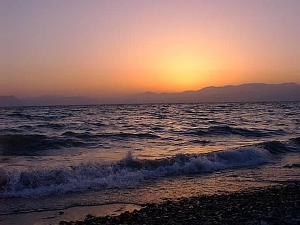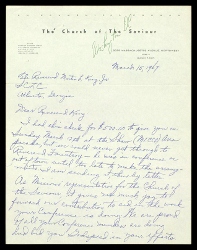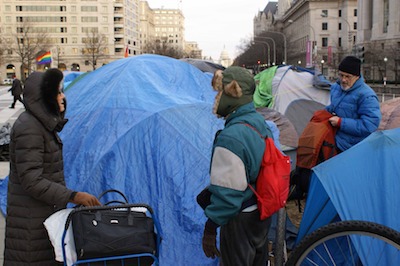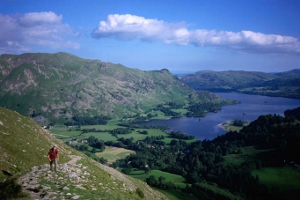Sermon: The First Occupation - Occupying Your True Name (Jim Hall 01-22-2012) back
In today’s Gospel lesson, Jesus leaves the Jordan Valley, where trouble is brewing and John has just been arrested (Mark 1:14-20). He comes to Galilee proclaiming the good news that the reign of God is near.  While walking along the sea of Galilee Jesus invites two fishermen – Simon, who will later be named Peter, and Andrew – to follow him and become fishers of people. And then we read “immediately they left their nets and followed Jesus.” Right after that, lest we miss the point, Jesus does it again. He calls James and John, and they leave right off from the family fishing business and follow Jesus.
While walking along the sea of Galilee Jesus invites two fishermen – Simon, who will later be named Peter, and Andrew – to follow him and become fishers of people. And then we read “immediately they left their nets and followed Jesus.” Right after that, lest we miss the point, Jesus does it again. He calls James and John, and they leave right off from the family fishing business and follow Jesus.
Every time I read these passages I am struck anew with how these men leave their established occupation and families so immediately. “Why so fast?” I wonder. What really happened? Didn’t they think it over at all, or consult with their spiritual support group, or go on a silent retreat? Did they really leave everything they had ever known without even a thought or a prayer, much less a plan? Surely they must have had a plan or some explanation of how it all made sense? What drew Simon and the others to make this response? Was it something in the “good news” that caught them, some great dream, some call to adventure? Or is it by its very nature a mystery, something forever beyond the grasp of our minds?
Ched Meyers offers us one way to view what happened. Ched, whom some of you know personally, is a seminary teacher, workshop facilitator, and author of books on Sabbath economics and the radical nonviolent witness of Jesus. Ched points out that these were perilous times of social and political ferment, of class warfare and imperial wars abroad, of increased taxes on poor fishermen, and of resistance movements to Roman oppression popping up all over the region.
Simon and his colleagues were more than ready to take up with some kind of resistance movement, according to Ched’s perspective. He imagines Jesus’ call to Simon going something like this: Let’s go and catch us some Big Fish and restore God’s justice to the poor. Anybody want to roll with this?
Ched draws some interesting parallels between this resistance movement of Jesus and the movement that Dr. King led in more recent times.  Both disobeyed the law to draw attention to the injustice inherent in it. At the end of their careers, both King and Jesus had to fight off enemies without and dissension within. And both movements were rooted in a deep spiritual base.
Both disobeyed the law to draw attention to the injustice inherent in it. At the end of their careers, both King and Jesus had to fight off enemies without and dissension within. And both movements were rooted in a deep spiritual base.
It is this latter point – being rooted in a deep spiritual base – that I want to explore this morning. What is the nature of the spiritual base that is required for such a resistance movement, especially today, in our own time of necessary resistance to injustice and oppression? I'm going to share a little story with you that raises that question up a notch for me, and then return to the story of Simon and his fellow fisherman to see how that might help us with this question.
I have long had a deep appreciation of the spiritual foundation of the movement that Dr. King led for Civil Rights – the meetings in churches, the songs, the teaching about nonviolence. Recently I read an article by Mary Elizabeth King (no relation to Dr. King, but someone who worked alongside him) in which she recalls how Dr. King promoted workshops on nonviolence in every meeting of the Southern Christian Leadership Conference. Scheduling afternoon workshops led by a black Methodist minister named James Lawson, Dr. King would tell people to "be back promptly at 2 pm for Brother Lawson's workshop on nonviolence." She goes on to say that "before the agreed time, King seated himself on the first pew, waiting attentively for the 3-hour session to start." The spiritual foundation of movements like this has seemed crucial in the past. But, I wonder, what about now? Is there anything like that happening in, say, the Occupy movement of our own day?

As some of you may know, a few of our brothers and sisters in the Church of the Saviour have made a connection with the Occupy movement down on Freedom Plaza in DC. A week ago Saturday I went down there to meet David and Marja Hilfiker and Eve Tetaz and help them to set up a Church of the Saviour tent where they would stay overnight, a tent I was contemplating occupying myself some Saturday night several weeks hence. Freedom Plaza is a little strip of mostly paved park tucked in between Pennsylvania Avenue and E Street that has been occupied by one of our local Occupy groups for the past several months.
It wasn’t long before I spotted David beneath a large backpack, heading for a small area with Marja and Eve where two dozen or so tents were crowded together. The man in charge of tents led us to a spot of bare ground where, if we could find a place to move the two bicycles parked there, we could pitch the smaller of the two tents David was carrying – a tent where Marja and Eve would spend the night. And so it was that Church of the Saviour first staked out its presence at Occupy Washington DC!
I stayed around for the evening G.A., which is how everyone refers to the General Assembly. A couple dozen of us gathered in one of the large, military-style canvas tents for the meeting – a diverse group of men, women, young, old, African American and white. A generator thrummed away, providing electricity for a few dim lights hanging from the rafters. A kerosene heater glowed in the center of the tent, giving some relief from the below freezing temperatures and bone-chilling breeze outside.
David and I and a young woman from an Occupy in North Carolina introduced ourselves as “first-timers” (Marja and Eve were already known by many of the Occupiers). The facilitator reviewed the hand signals for us: Hands with fingers up to indicate agreement with what was being said and with fingers down to indicate disagreement, hands crossed over chest with fists clenched to indicate extreme disagreement, and hands in front making cutting motions to indicate a desire for the facilitator to cut short the speaker.
An ex-military man led off with his issues about accountability for the work groups; everyone there “volunteers” two hours daily for housekeeping work, thus earning a place toward the front of the food line at dinnertime. Others had equally strong feelings that anyone who wants food should be fed regardless of whether or not they had worked. After much discussion with vigorous display of all forms of the hand signals and one change of facilitators, the food issue was once again tabled (it had been one of four items tabled from the morning GA). Next the discussion turned to those who had moved out to two houses that were being occupied. Would they be included in decision-making at Freedom Plaza, and if so, how? A decision was made on part of that issue, but the other issues were again tabled. At one point someone spoke up to say that we were here to protest injustice, corporate greed and corporate power over politics and economics, and instead we were spending our time and energy on housekeeping issues. This observation brought a crescendo of upward raised hands and fingers.
After the meeting, Marja mentioned to me that the young woman from the North Carolina Occupy said how great she thought the meeting had been. "What did you think of it?" she asked. My first response was to say that through the years in Church of the Saviour I have often felt frustrated by our decision-making process which seems laborious and indecisive to me at times, but after the cumbersome process of this G.A. meeting I found myself feeling a lot better about it!
Marja, who I know feels very hopeful because of what’s happening here, asked me if I were encouraged or discouraged. I pondered her question a minute and then said, “You know, I’m not ready to decide that yet; I need to be here more, not rush to judgment, so I believe that I’ll just have to table that for now!”
On further reflection, that’s pretty much where I still am. This movement is far enough outside my usual experience that I need much more immersion in it to be able to say if it gives me real hope or not. How presumptuous it would be for me to say anything about the nature of the spiritual foundation of this movement based on my momentary encounter with it! I certainly do affirm the excitement and the energy and the ability to vent emotions and to hold differences together – grassroots democracy. I saw important and good things happening there, gifts that are so needed in our time. But the question I began with still pulls hard at me. What sort of spiritual base is required for a movement like this? Is it here already? Is what’s happening just based on some mysterious initial energy, maybe something like the energy that Simon Peter responded to initially so long ago? Is the deeper spiritual grounding lying somewhere ahead in a future yet to unfold?
I return now to the story of Simon and his fellow fishermen to consider more of his faith journey, to see what happened after that initial call to follow Jesus what sort of spiritual grounding developed. And, of course, as with any important question we find ourselves asking about something out there, it is always also a question that turns itself toward us as well. What sort of spiritual grounding am I, are you, developing for our own movement into the realm of God?
Before long, as we read in only the third chapter of Mark, Simon is given a new name – Peter. Mark doesn’t make much of this naming, but Matthew does, making a play on the Greek words for rock, petros and petra. In Matthew, Jesus says to Simon, “You are Peter (petros, the masculine form of the word for rock) and upon this rock (petra, the feminine form of the Greek word for rock) I will build my church. Thus “Simon” becomes “Simon Peter” and later “Peter.” Jesus goes on to give one of his teachings about abandoning self, about losing one’s life for Jesus’ cause. I think that teaching about abandonment of self, or false self, has a lot to do with discovering who we really are intended to become, with discovering our true name.
In this instance, in this naming, something is being recognized and affirmed in the new and deeper self, the core identity of this disciple who henceforth would be called Peter (or Rock). The giving of new names has often been significant in the Bible. Abram, Sarai, Jacob, and Saul for example, received new names that were outward signs of new identity. Some new dimension of Simon has become apparent to Jesus, and he is given a new name.
Becoming aware of your true name – your deepest self – also reminds me of Psalm 139. The Psalmist speaks of God who has searched us and known us in our depths, who "formed us in our inward parts," and "knit us together in our mother's womb." We have been "intricately woven in the depths of the earth."
In the story of Peter and this new movement, at times things go well. The disciples are sent out two by two, and they return rejoicing that even the demons submit to them. Jesus reminds them to rejoice not so much that the demons submit, but rejoice instead that their names are written in the heavens. I think Jesus is inviting them to remember that they have been named from another realm.
At other times, the work goes less well for this new movement. We read that, "many disciples turn back and no longer go about with Jesus." Jesus wonders if the Twelve also wish to go away. It is Peter who responds, "Lord to whom can we go? You have the words of eternal life." Peter – the Rock – remaining committed, keeping his vow so to speak in the face of adversity. So, has Peter become the true disciple? Has he found his deepest identity and been able to give his gift to the world?
Of course not. Not long thereafter we see the disciples, perhaps including Peter, arguing with one another as to who is the greatest. At this moment in their journey the disciples are still saying, as Richard Rohr would put it, "life is about me." The full conversion to "I am about life" is still a work in progress it seems. So Jesus lays it out for them again, saying "the greatest among you must become like the youngest, and the leader like one who serves."
And then, in a great dramatic turn, Peter boasts that he will never betray Jesus, that he is ready to die with him if necessary. But before the cock crows three times, Peter betrays Jesus three times. For a long time thereafter Peter is lost, defeated, a failure, no more "the Rock." So he goes back to Galilee, to his boat and his nets and resumes fishing for fish. Is it really all over? Or will failure and suffering prove to be a great teacher for Peter?
One morning as he comes in from fishing, Peter sees Jesus on the shore. They eat a bread-and-fish communion meal together, and Jesus calls to him using his earlier name, Simon. "Simon, do you love me more than these?" Jesus says. Peter says, "Yes, you know that I love you." And so in this meeting, in this ceremony, in the three times Jesus asks the question, and the three times Peter says "Yes," Peter comes to know that he is fully forgiven for his betrayal, his failure. And having been through that experience of failure and forgiveness, Jesus knows that Peter is now ready for an even deeper naming. He says to Peter, “feed my lambs; tend my sheep; feed my sheep.” So this disciple, once called Simon the fisherman, then called Peter the Rock, is now given a deeper calling to tend and to feed the lambs and sheep of this new movement, this new realm of God in the world. Out of his experience of being deeply forgiven and deeply loved, Peter is now prepared to become love, to become self giving, poured out love, to make that shift from "my life is about me" to "I am about life." Peter, as we know, would go on to become a leader in the particular expression of this new movement that remained over the decades in Jerusalem.
As we have taken this brief look back at the story of Peter, just one of the followers of Jesus in those early days of the Christian faith, we see that most of the story is not about whatever got the attention of a fisherman called Simon and led him to leave everything and follow Jesus. However it began, the real story is filled with continuing moments of deeper conversion, of discovering a deeper identity, and discovering the unique gift to be given to the world. The story seems to have begun with something that was planted in him at that first encounter with Jesus, something that led him step by step in his journey, something beyond his knowing. To use an expression from the poetry of William Wordsworth, it is almost as if a vow had been made for him.
Wordsworth, the English romantic poet, spent his early years in the scenic Lake District of northwest England, rambling the countryside and writing poetry.  His parents died when he was young, and he lived with his guardians who wanted him to become a vicar, to ensure income for himself and his sister. But Wordsworth knew he was not to be a vicar. One morning while walking out in the hill country he came to know deep inside himself that he was indeed a poet. Years later he wrote about that moment in a poem he called Prelude. This is what he wrote:
His parents died when he was young, and he lived with his guardians who wanted him to become a vicar, to ensure income for himself and his sister. But Wordsworth knew he was not to be a vicar. One morning while walking out in the hill country he came to know deep inside himself that he was indeed a poet. Years later he wrote about that moment in a poem he called Prelude. This is what he wrote:
Two miles I had to walk along the fields
Before I reach'd my home. Magnificent
The Morning was, a memorable pomp,
More glorious than I ever had beheld;
The Sea was laughing at a distance; all
The solid Mountains were as bright as clouds,
Grain-tinctured, drench'd in empyrean light;
And, in the meadows and the lower grounds,
Was all the sweetness of a common dawn,
Dews, vapours, and the melody of birds,
And Labourers going forth into the fields.
--Ah! need I say, dear Friend, that to the brim
My heart was full; I made no vows, but vows
Were then made for me; bond unknown to me
Was given, that I should be, else sinning greatly,
A dedicated Spirit. On I walk'd
In blessedness which even yet remains.
The contemporary poet David Whyte says this about that revelatory moment in Wordsworth's life: "What was at the core of this revelation? The understanding that he was made for the world in a certain way, and that, because of the way he was made and because of the particular conversation he held with creation that he would bring out in his work, certain vows had been made on his behalf. So here Wordsworth is seeing work as a commitment, a kind of marriage."
Similar to Wordsworth’s inner revelation about his identity and his work, I’m coming to realize that any mission work that we do, any resistance movement, emerges not primarily from some external need or imperative – not from some voice out there that says, "This must be done, therefore you do it," but rather arises most genuinely from the inside, out of discovering who we truly are and what is the unique gift that we have to give the world.
And so my questions for Occupy and for me and for us are not the usual reporter's questions like: What's your plan? What's your goal in all this? What's your agenda? Rather the questions I wonder about are more like this: Who are you? What do you know of your true name? Perhaps the first Occupation is to occupy your true name.
So how am I, how are you, doing with that first occupation? What do you know now about your true name? And how are you making that deepest self within you visible to the world? And how are you giving the unique gift that is yours to give to the world?
And for us, I wonder, how are we, together, tending and feeding each other in this process of knowing and living out of our deepest selves? How are we gardening the gift that is trying to come forth from each one of us collectively?
At times I have wondered – and rest assured this is pure speculation on my part, not a plan – I have wondered: Do we at Dayspring have anything to offer the Occupy movement, or to offer other resistance movements, transition movements of our day? A place perhaps to explore these questions of the spiritual foundation of resistance? And in turn, what might Occupy have to offer us?
Would we dare to say, "Come and see?" Come, walk in the fields. Come climb a tree, sit by the lake. Go deep into the woods for a walk, discover more of who you really are, and about your gift for the life of the world. And by the way, I believe that we can find you a tent site or two here somewhere!
I want to close with a spiritual that we will listen to after we hear ourselves say the words. I first heard it this past Monday in the service at the National Cathedral celebrating Dr. King's birthday. This music is not the version sung at that service, but rather one that comes from the Metropolitan Baptist Church here in Washington. So here are the words – repeat each line after me:
Done kept my vow to the Lord
And I never will turn back
I will go
I shall go
and see what the end gonna be.
Sermon by Jim Hall
Dayspring Church
1/22/2012